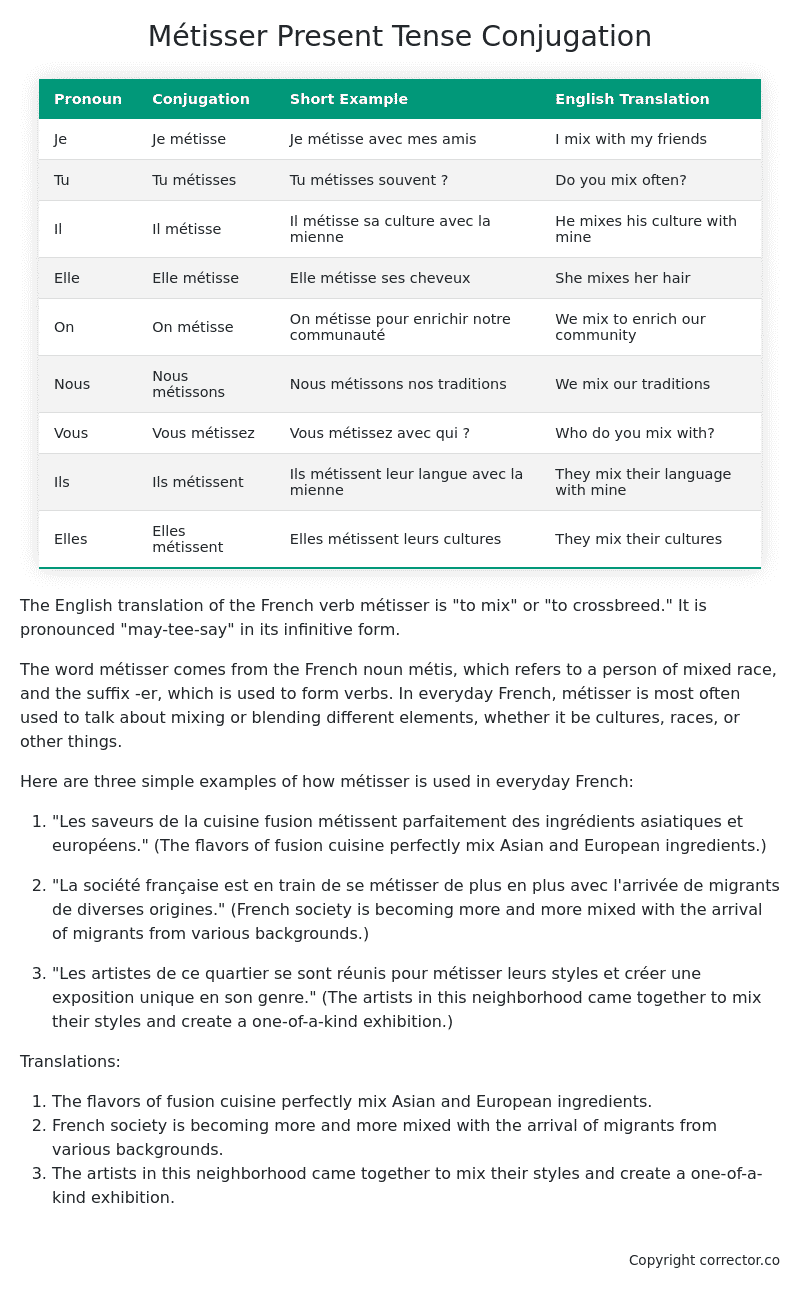Le Present (Present Tense) Conjugation of the French Verb métisser
Introduction to the verb métisser
The English translation of the French verb métisser is “to mix” or “to crossbreed.” It is pronounced “may-tee-say” in its infinitive form.
The word métisser comes from the French noun métis, which refers to a person of mixed race, and the suffix -er, which is used to form verbs. In everyday French, métisser is most often used to talk about mixing or blending different elements, whether it be cultures, races, or other things.
Here are three simple examples of how métisser is used in everyday French:
-
“Les saveurs de la cuisine fusion métissent parfaitement des ingrédients asiatiques et européens.” (The flavors of fusion cuisine perfectly mix Asian and European ingredients.)
-
“La société française est en train de se métisser de plus en plus avec l’arrivée de migrants de diverses origines.” (French society is becoming more and more mixed with the arrival of migrants from various backgrounds.)
-
“Les artistes de ce quartier se sont réunis pour métisser leurs styles et créer une exposition unique en son genre.” (The artists in this neighborhood came together to mix their styles and create a one-of-a-kind exhibition.)
Translations:
- The flavors of fusion cuisine perfectly mix Asian and European ingredients.
- French society is becoming more and more mixed with the arrival of migrants from various backgrounds.
- The artists in this neighborhood came together to mix their styles and create a one-of-a-kind exhibition.
Métisser – About the French Present Tense
To take a deep dive into all the French tenses then see our article on Mastering French Tense Conjugation.
Common Everyday Usage Patterns For Le Present
Interactions with Other Tenses
Table of the Present Tense Conjugation of métisser
| Pronoun | Conjugation | Short Example | English Translation |
|---|---|---|---|
| Je | Je métisse | Je métisse avec mes amis | I mix with my friends |
| Tu | Tu métisses | Tu métisses souvent ? | Do you mix often? |
| Il | Il métisse | Il métisse sa culture avec la mienne | He mixes his culture with mine |
| Elle | Elle métisse | Elle métisse ses cheveux | She mixes her hair |
| On | On métisse | On métisse pour enrichir notre communauté | We mix to enrich our community |
| Nous | Nous métissons | Nous métissons nos traditions | We mix our traditions |
| Vous | Vous métissez | Vous métissez avec qui ? | Who do you mix with? |
| Ils | Ils métissent | Ils métissent leur langue avec la mienne | They mix their language with mine |
| Elles | Elles métissent | Elles métissent leurs cultures | They mix their cultures |
Other Conjugations for Métisser.
Le Present (Present Tense) Conjugation of the French Verb métisser (this article)
Imparfait (Imperfect) Tense Conjugation of the French Verb métisser
Passé Simple (Simple Past) Tense Conjugation of the French Verb métisser
Passé Composé (Present Perfect) Tense Conjugation of the French Verb métisser
Futur Simple (Simple Future) Tense Conjugation of the French Verb métisser
Futur Proche (Near Future) Tense Conjugation of the French Verb métisser
Plus-que-parfait (Pluperfect) Tense Conjugation of the French Verb métisser
Passé Antérieur (Past Anterior) Tense Conjugation of the French Verb métisser
Futur Antérieur (Future Anterior) Tense Conjugation of the French Verb métisser
Subjonctif Présent (Subjunctive Present) Tense Conjugation of the French Verb métisser
Subjonctif Passé (Subjunctive Past) Tense Conjugation of the French Verb métisser
Subjonctif Imparfait (Subjunctive Imperfect) Tense Conjugation of the French Verb métisser
Subjonctif Plus-que-parfait (Subjunctive Pluperfect) Tense Conjugation of the French Verb métisser
Conditionnel Présent (Conditional Present) Tense Conjugation of the French Verb métisser
Conditionnel Passé (Conditional Past) Tense Conjugation of the French Verb métisser
L’impératif Présent (Imperative Present) Tense Conjugation of the French Verb métisser
L’infinitif Présent (Infinitive Present) Tense Conjugation of the French Verb métisser
Struggling with French verbs or the language in general? Why not use our free French Grammar Checker – no registration required!
Get a FREE Download Study Sheet of this Conjugation 🔥
Simply right click the image below, click “save image” and get your free reference for the métisser Present Tense tense conjugation!

I hope you enjoyed this article on the verb métisser. Still in a learning mood? Check out another TOTALLY random French verb present conjugation!


